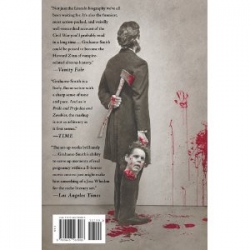Growing up, I was a connoisseur of horror films, often gravitating toward the quirkily titled hoping to find a petunia in the onion patch. I endured dozens of clunkers like Jesse James meets Frankenstein’s Daughter, The Thing With Two Heads and Invasion of the Bee Girls for every gem like Blood Splattered Bride. These films rarely terrified but would entertain with a combination cleverness and, often, unintentional humor. Therefore while perusing the aisles of Barnes and Noble, I could not help but be attracted to a book titled Abraham Lincoln: Vampire Hunter featuring an iconic black and white photo of Lincoln with red, bloody hand prints trying to conceal an axe behind his back. Could this be the book equivalent of those horror film favorites of my youth?
Abraham Lincoln: Vampire Hunter is Seth Grahame-Smith’s follow-up to his best selling debut Pride and Prejudice and Zombies. Being neither a fan of Jane Austin nor literary zombies, I passed on Grahame-Smith’s first attempt. Still I have always had a soft spot in my heart for vampires, so I gave Abe a chance.
The story begins when a struggling writer is given journals by a mysterious patron and is asked to create a manuscript from them. The books are penned by Lincoln and describe his life-long mission to destroy vampires, after realizing his mother was a victim of the creatures. Under the tutelage of a vampire turncoat named Henry, Abe destroys a gaggle of blood-drinkers while becoming embroiled in politics. The nation is on the brink of a civil war which was brought about by the vampires themselves to keep slavery, a valuable source of nourishment. Along the way, Abe befriends Edgar Allen Poe, debates Stephen Douglas and fails to assassinate Jefferson Davis before the War.
Grahame-Smith has crafted a well written story that truly captures the voice of Lincoln and the nineteenth century speech. He has thoroughly researched his subject and weaves fact and fiction so well it becomes difficult to differentiate between the two. The introspective nature Lincoln’s journal conveys struggles with loss and depression even contemplations of suicide. This is a serious work and this is where I have my reservations about the book.
I was incorrect with my expectation of levity, but the title seems to indicate a level of non-seriousness. I did find myself, however, drawn into the story and wondering how Grahame-Smith would skew the various accomplishments of Lincoln life toward the supernatural. The read is engrossing if ultimately unfulfilling, due mostly to my ill-conceived prejudgment.
While researching this blog, I discovered that Abraham Lincoln: Vampire Hunter is in production and will be a major release next summer, with blockbuster aspirations. If they stay true to the book, I know not to expect a campy horror film but, if they want fannies in the seats, I suggest balancing the fear factor with deliberate absurdity. The Lost Boys does this exquisitely and I suggest the filmmakers inject some farcical elements into the secondary characters while Lincoln stays true to Grahame-Smith’s original vision. I would love to add Abraham Lincoln: Vampire Hunter to my list of all-time favorite horror films right behind Children Shouldn’t Play With Dead Things, I Bury The Living and Blood on Satan’s Claw.





